Business Laws Report: Separation of Powers, Contract Law Analysis
VerifiedAdded on 2022/05/25
|13
|2650
|27
Report
AI Summary
This report delves into the core principles of business law, primarily focusing on the doctrine of separation of powers within the Australian constitution and contract law. Part A of the report meticulously explains the separation of powers, detailing the functions of the legislative, executive, and judicial branches of government. It highlights the significance of this doctrine in preventing the misuse of power and maintaining the rule of law. Part B then shifts to contract law, defining contracts and their essential elements, including offer, acceptance, consideration, capacity, and consent. It also explores the legal requirements for electronic contracts, referencing the Electronic Transaction Act 1999. The report incorporates relevant case laws such as Dunlop Pneumatic Tyre Co v Selfridge, Chappell & Co Ltd v Nestle Co Ltd, Mort & Co. Ltd v Quinn, and Masters v Cameron to illustrate key concepts. Finally, the report applies these legal principles to a case study involving Events Management Ltd and Rigby Corporate Function Planners, concluding that no legally binding contract existed due to the absence of consideration and failure to meet contract formation requirements.
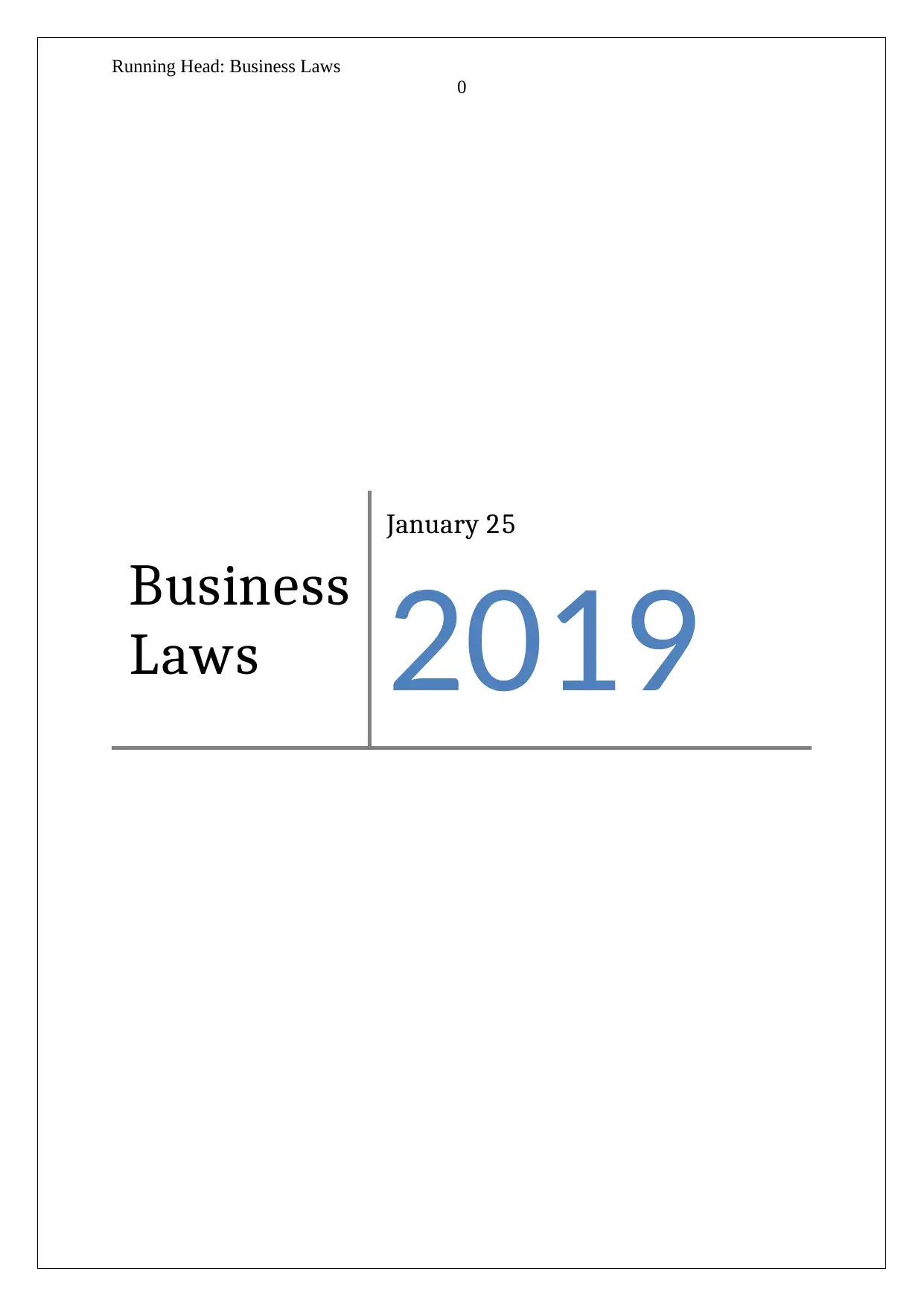
Running Head: Business Laws
0
Business
Laws
January 25
2019
0
Business
Laws
January 25
2019
Paraphrase This Document
Need a fresh take? Get an instant paraphrase of this document with our AI Paraphraser
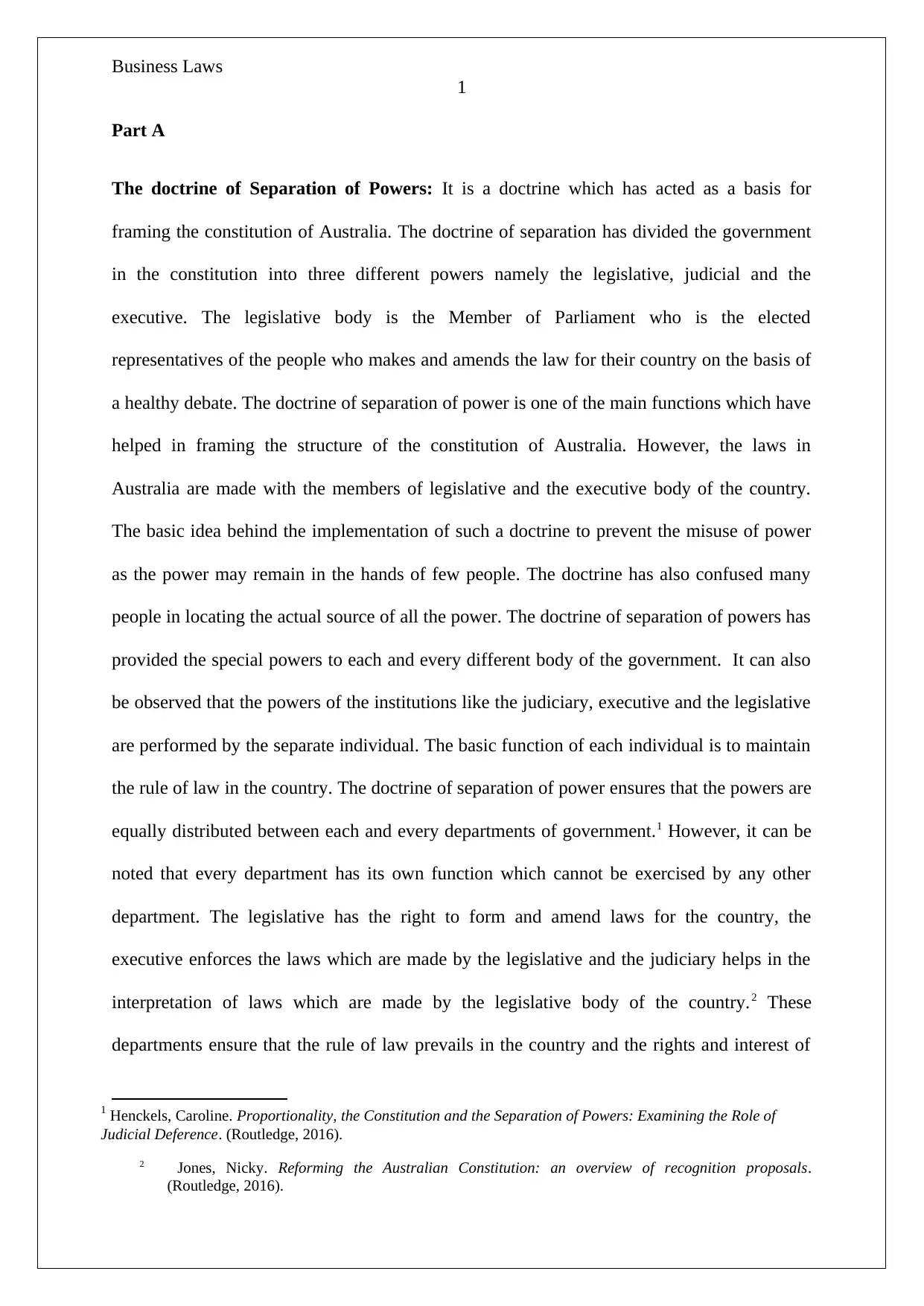
Business Laws
1
Part A
The doctrine of Separation of Powers: It is a doctrine which has acted as a basis for
framing the constitution of Australia. The doctrine of separation has divided the government
in the constitution into three different powers namely the legislative, judicial and the
executive. The legislative body is the Member of Parliament who is the elected
representatives of the people who makes and amends the law for their country on the basis of
a healthy debate. The doctrine of separation of power is one of the main functions which have
helped in framing the structure of the constitution of Australia. However, the laws in
Australia are made with the members of legislative and the executive body of the country.
The basic idea behind the implementation of such a doctrine to prevent the misuse of power
as the power may remain in the hands of few people. The doctrine has also confused many
people in locating the actual source of all the power. The doctrine of separation of powers has
provided the special powers to each and every different body of the government. It can also
be observed that the powers of the institutions like the judiciary, executive and the legislative
are performed by the separate individual. The basic function of each individual is to maintain
the rule of law in the country. The doctrine of separation of power ensures that the powers are
equally distributed between each and every departments of government.1 However, it can be
noted that every department has its own function which cannot be exercised by any other
department. The legislative has the right to form and amend laws for the country, the
executive enforces the laws which are made by the legislative and the judiciary helps in the
interpretation of laws which are made by the legislative body of the country.2 These
departments ensure that the rule of law prevails in the country and the rights and interest of
1 Henckels, Caroline. Proportionality, the Constitution and the Separation of Powers: Examining the Role of
Judicial Deference. (Routledge, 2016).
2 Jones, Nicky. Reforming the Australian Constitution: an overview of recognition proposals.
(Routledge, 2016).
1
Part A
The doctrine of Separation of Powers: It is a doctrine which has acted as a basis for
framing the constitution of Australia. The doctrine of separation has divided the government
in the constitution into three different powers namely the legislative, judicial and the
executive. The legislative body is the Member of Parliament who is the elected
representatives of the people who makes and amends the law for their country on the basis of
a healthy debate. The doctrine of separation of power is one of the main functions which have
helped in framing the structure of the constitution of Australia. However, the laws in
Australia are made with the members of legislative and the executive body of the country.
The basic idea behind the implementation of such a doctrine to prevent the misuse of power
as the power may remain in the hands of few people. The doctrine has also confused many
people in locating the actual source of all the power. The doctrine of separation of powers has
provided the special powers to each and every different body of the government. It can also
be observed that the powers of the institutions like the judiciary, executive and the legislative
are performed by the separate individual. The basic function of each individual is to maintain
the rule of law in the country. The doctrine of separation of power ensures that the powers are
equally distributed between each and every departments of government.1 However, it can be
noted that every department has its own function which cannot be exercised by any other
department. The legislative has the right to form and amend laws for the country, the
executive enforces the laws which are made by the legislative and the judiciary helps in the
interpretation of laws which are made by the legislative body of the country.2 These
departments ensure that the rule of law prevails in the country and the rights and interest of
1 Henckels, Caroline. Proportionality, the Constitution and the Separation of Powers: Examining the Role of
Judicial Deference. (Routledge, 2016).
2 Jones, Nicky. Reforming the Australian Constitution: an overview of recognition proposals.
(Routledge, 2016).
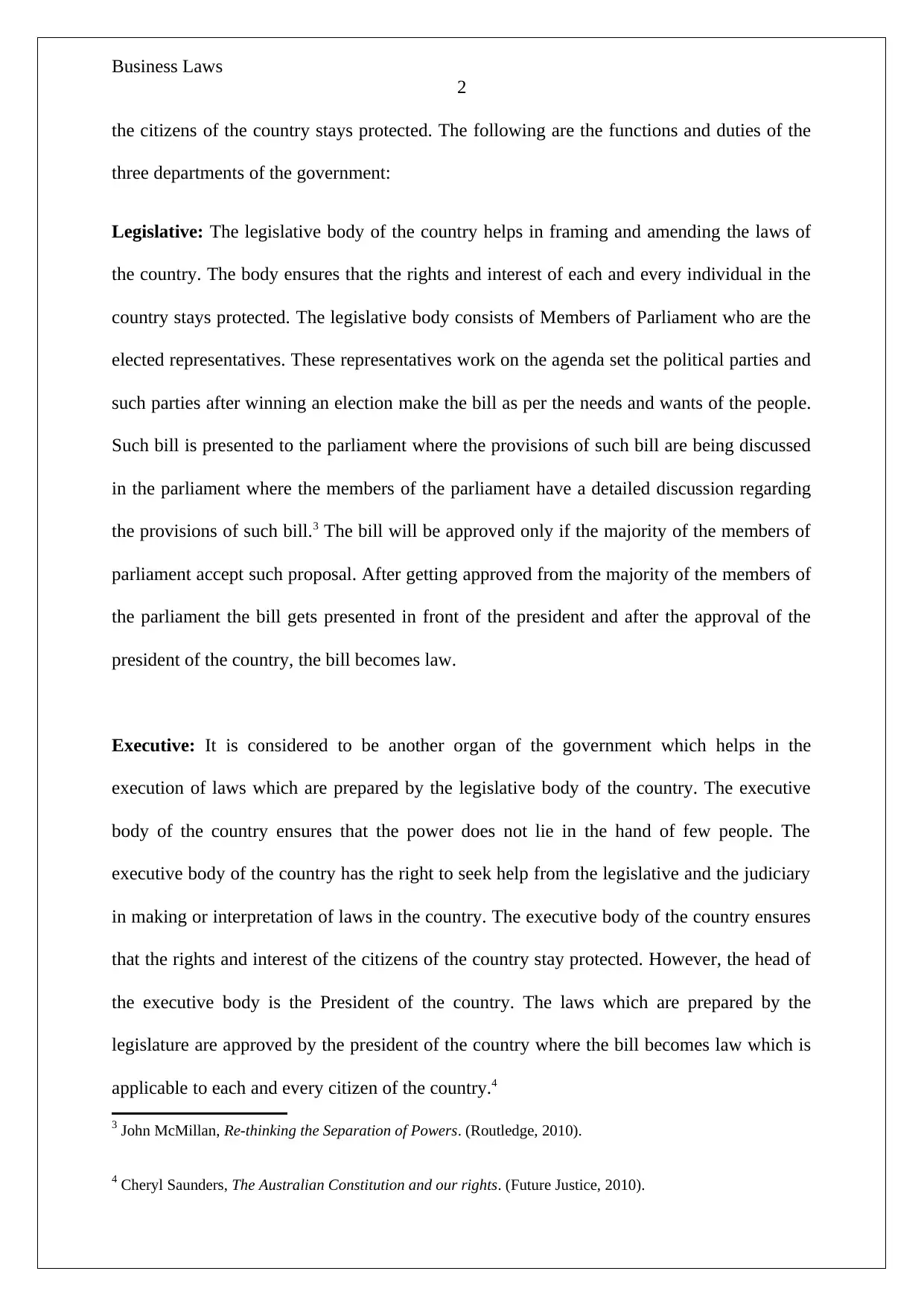
Business Laws
2
the citizens of the country stays protected. The following are the functions and duties of the
three departments of the government:
Legislative: The legislative body of the country helps in framing and amending the laws of
the country. The body ensures that the rights and interest of each and every individual in the
country stays protected. The legislative body consists of Members of Parliament who are the
elected representatives. These representatives work on the agenda set the political parties and
such parties after winning an election make the bill as per the needs and wants of the people.
Such bill is presented to the parliament where the provisions of such bill are being discussed
in the parliament where the members of the parliament have a detailed discussion regarding
the provisions of such bill.3 The bill will be approved only if the majority of the members of
parliament accept such proposal. After getting approved from the majority of the members of
the parliament the bill gets presented in front of the president and after the approval of the
president of the country, the bill becomes law.
Executive: It is considered to be another organ of the government which helps in the
execution of laws which are prepared by the legislative body of the country. The executive
body of the country ensures that the power does not lie in the hand of few people. The
executive body of the country has the right to seek help from the legislative and the judiciary
in making or interpretation of laws in the country. The executive body of the country ensures
that the rights and interest of the citizens of the country stay protected. However, the head of
the executive body is the President of the country. The laws which are prepared by the
legislature are approved by the president of the country where the bill becomes law which is
applicable to each and every citizen of the country.4
3 John McMillan, Re-thinking the Separation of Powers. (Routledge, 2010).
4 Cheryl Saunders, The Australian Constitution and our rights. (Future Justice, 2010).
2
the citizens of the country stays protected. The following are the functions and duties of the
three departments of the government:
Legislative: The legislative body of the country helps in framing and amending the laws of
the country. The body ensures that the rights and interest of each and every individual in the
country stays protected. The legislative body consists of Members of Parliament who are the
elected representatives. These representatives work on the agenda set the political parties and
such parties after winning an election make the bill as per the needs and wants of the people.
Such bill is presented to the parliament where the provisions of such bill are being discussed
in the parliament where the members of the parliament have a detailed discussion regarding
the provisions of such bill.3 The bill will be approved only if the majority of the members of
parliament accept such proposal. After getting approved from the majority of the members of
the parliament the bill gets presented in front of the president and after the approval of the
president of the country, the bill becomes law.
Executive: It is considered to be another organ of the government which helps in the
execution of laws which are prepared by the legislative body of the country. The executive
body of the country ensures that the power does not lie in the hand of few people. The
executive body of the country has the right to seek help from the legislative and the judiciary
in making or interpretation of laws in the country. The executive body of the country ensures
that the rights and interest of the citizens of the country stay protected. However, the head of
the executive body is the President of the country. The laws which are prepared by the
legislature are approved by the president of the country where the bill becomes law which is
applicable to each and every citizen of the country.4
3 John McMillan, Re-thinking the Separation of Powers. (Routledge, 2010).
4 Cheryl Saunders, The Australian Constitution and our rights. (Future Justice, 2010).
⊘ This is a preview!⊘
Do you want full access?
Subscribe today to unlock all pages.

Trusted by 1+ million students worldwide
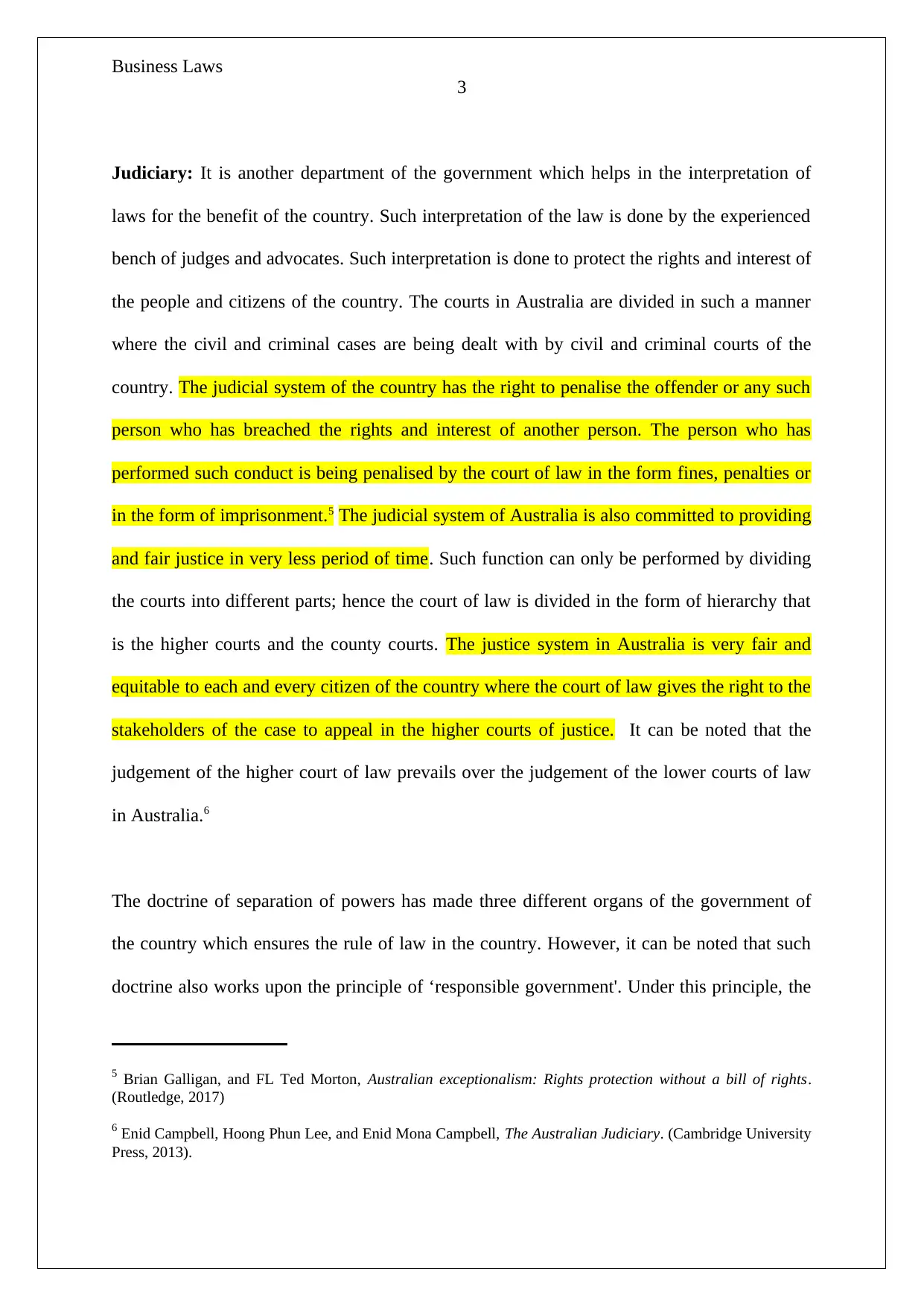
Business Laws
3
Judiciary: It is another department of the government which helps in the interpretation of
laws for the benefit of the country. Such interpretation of the law is done by the experienced
bench of judges and advocates. Such interpretation is done to protect the rights and interest of
the people and citizens of the country. The courts in Australia are divided in such a manner
where the civil and criminal cases are being dealt with by civil and criminal courts of the
country. The judicial system of the country has the right to penalise the offender or any such
person who has breached the rights and interest of another person. The person who has
performed such conduct is being penalised by the court of law in the form fines, penalties or
in the form of imprisonment.5 The judicial system of Australia is also committed to providing
and fair justice in very less period of time. Such function can only be performed by dividing
the courts into different parts; hence the court of law is divided in the form of hierarchy that
is the higher courts and the county courts. The justice system in Australia is very fair and
equitable to each and every citizen of the country where the court of law gives the right to the
stakeholders of the case to appeal in the higher courts of justice. It can be noted that the
judgement of the higher court of law prevails over the judgement of the lower courts of law
in Australia.6
The doctrine of separation of powers has made three different organs of the government of
the country which ensures the rule of law in the country. However, it can be noted that such
doctrine also works upon the principle of ‘responsible government'. Under this principle, the
5 Brian Galligan, and FL Ted Morton, Australian exceptionalism: Rights protection without a bill of rights.
(Routledge, 2017)
6 Enid Campbell, Hoong Phun Lee, and Enid Mona Campbell, The Australian Judiciary. (Cambridge University
Press, 2013).
3
Judiciary: It is another department of the government which helps in the interpretation of
laws for the benefit of the country. Such interpretation of the law is done by the experienced
bench of judges and advocates. Such interpretation is done to protect the rights and interest of
the people and citizens of the country. The courts in Australia are divided in such a manner
where the civil and criminal cases are being dealt with by civil and criminal courts of the
country. The judicial system of the country has the right to penalise the offender or any such
person who has breached the rights and interest of another person. The person who has
performed such conduct is being penalised by the court of law in the form fines, penalties or
in the form of imprisonment.5 The judicial system of Australia is also committed to providing
and fair justice in very less period of time. Such function can only be performed by dividing
the courts into different parts; hence the court of law is divided in the form of hierarchy that
is the higher courts and the county courts. The justice system in Australia is very fair and
equitable to each and every citizen of the country where the court of law gives the right to the
stakeholders of the case to appeal in the higher courts of justice. It can be noted that the
judgement of the higher court of law prevails over the judgement of the lower courts of law
in Australia.6
The doctrine of separation of powers has made three different organs of the government of
the country which ensures the rule of law in the country. However, it can be noted that such
doctrine also works upon the principle of ‘responsible government'. Under this principle, the
5 Brian Galligan, and FL Ted Morton, Australian exceptionalism: Rights protection without a bill of rights.
(Routledge, 2017)
6 Enid Campbell, Hoong Phun Lee, and Enid Mona Campbell, The Australian Judiciary. (Cambridge University
Press, 2013).
Paraphrase This Document
Need a fresh take? Get an instant paraphrase of this document with our AI Paraphraser
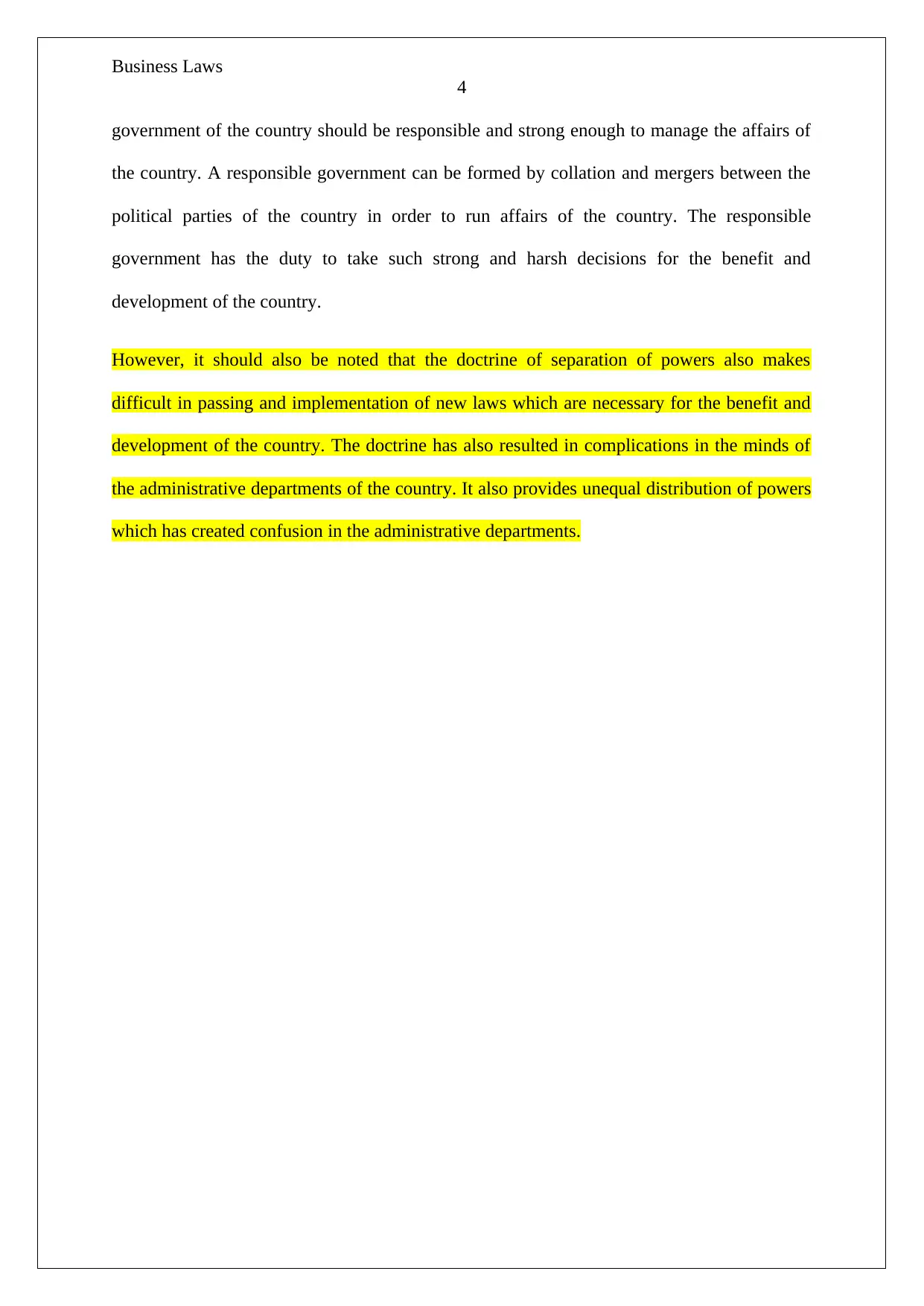
Business Laws
4
government of the country should be responsible and strong enough to manage the affairs of
the country. A responsible government can be formed by collation and mergers between the
political parties of the country in order to run affairs of the country. The responsible
government has the duty to take such strong and harsh decisions for the benefit and
development of the country.
However, it should also be noted that the doctrine of separation of powers also makes
difficult in passing and implementation of new laws which are necessary for the benefit and
development of the country. The doctrine has also resulted in complications in the minds of
the administrative departments of the country. It also provides unequal distribution of powers
which has created confusion in the administrative departments.
4
government of the country should be responsible and strong enough to manage the affairs of
the country. A responsible government can be formed by collation and mergers between the
political parties of the country in order to run affairs of the country. The responsible
government has the duty to take such strong and harsh decisions for the benefit and
development of the country.
However, it should also be noted that the doctrine of separation of powers also makes
difficult in passing and implementation of new laws which are necessary for the benefit and
development of the country. The doctrine has also resulted in complications in the minds of
the administrative departments of the country. It also provides unequal distribution of powers
which has created confusion in the administrative departments.
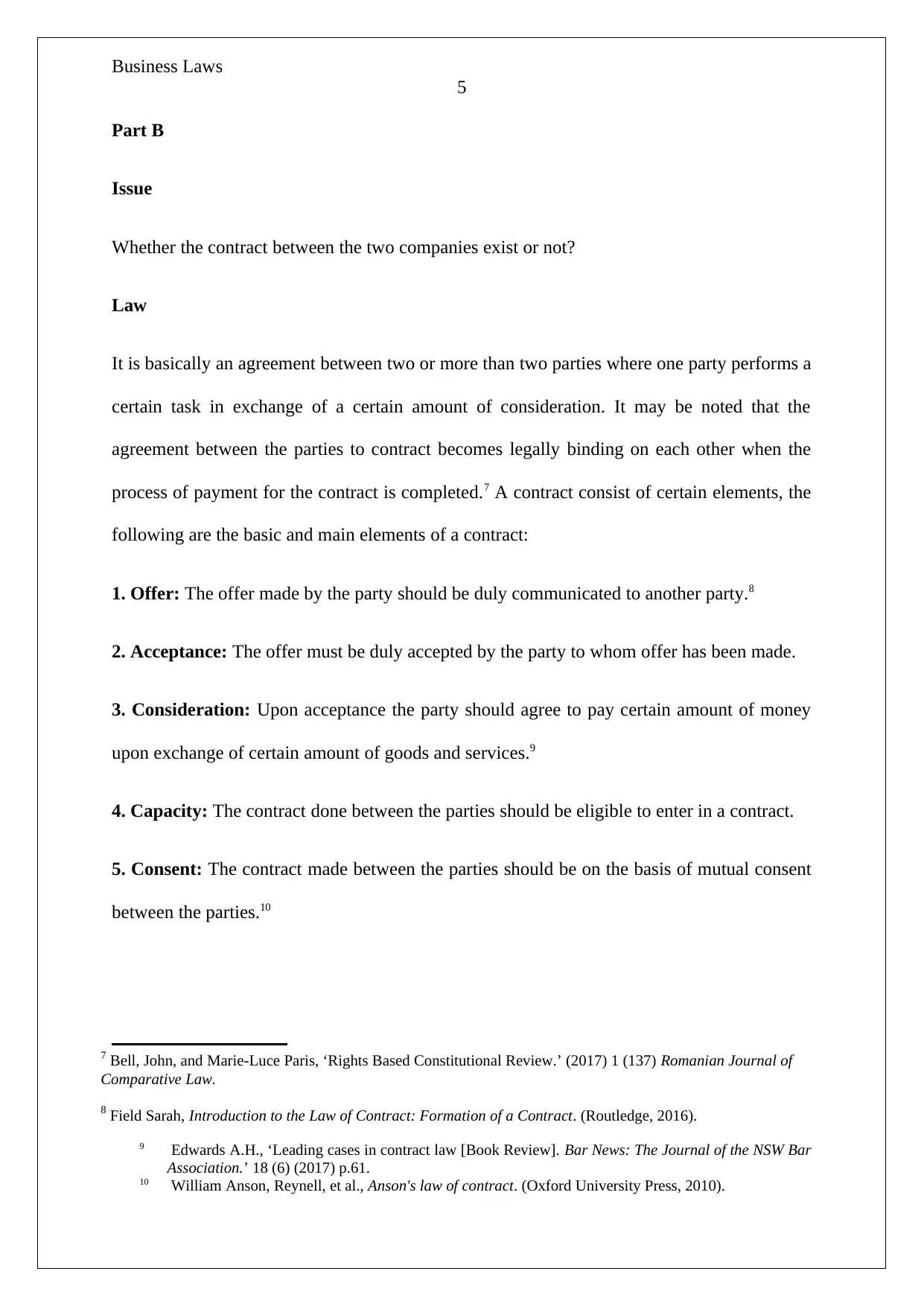
Business Laws
5
Part B
Issue
Whether the contract between the two companies exist or not?
Law
It is basically an agreement between two or more than two parties where one party performs a
certain task in exchange of a certain amount of consideration. It may be noted that the
agreement between the parties to contract becomes legally binding on each other when the
process of payment for the contract is completed.7 A contract consist of certain elements, the
following are the basic and main elements of a contract:
1. Offer: The offer made by the party should be duly communicated to another party.8
2. Acceptance: The offer must be duly accepted by the party to whom offer has been made.
3. Consideration: Upon acceptance the party should agree to pay certain amount of money
upon exchange of certain amount of goods and services.9
4. Capacity: The contract done between the parties should be eligible to enter in a contract.
5. Consent: The contract made between the parties should be on the basis of mutual consent
between the parties.10
7 Bell, John, and Marie-Luce Paris, ‘Rights Based Constitutional Review.’ (2017) 1 (137) Romanian Journal of
Comparative Law.
8 Field Sarah, Introduction to the Law of Contract: Formation of a Contract. (Routledge, 2016).
9 Edwards A.H., ‘Leading cases in contract law [Book Review]. Bar News: The Journal of the NSW Bar
Association.’ 18 (6) (2017) p.61.
10 William Anson, Reynell, et al., Anson's law of contract. (Oxford University Press, 2010).
5
Part B
Issue
Whether the contract between the two companies exist or not?
Law
It is basically an agreement between two or more than two parties where one party performs a
certain task in exchange of a certain amount of consideration. It may be noted that the
agreement between the parties to contract becomes legally binding on each other when the
process of payment for the contract is completed.7 A contract consist of certain elements, the
following are the basic and main elements of a contract:
1. Offer: The offer made by the party should be duly communicated to another party.8
2. Acceptance: The offer must be duly accepted by the party to whom offer has been made.
3. Consideration: Upon acceptance the party should agree to pay certain amount of money
upon exchange of certain amount of goods and services.9
4. Capacity: The contract done between the parties should be eligible to enter in a contract.
5. Consent: The contract made between the parties should be on the basis of mutual consent
between the parties.10
7 Bell, John, and Marie-Luce Paris, ‘Rights Based Constitutional Review.’ (2017) 1 (137) Romanian Journal of
Comparative Law.
8 Field Sarah, Introduction to the Law of Contract: Formation of a Contract. (Routledge, 2016).
9 Edwards A.H., ‘Leading cases in contract law [Book Review]. Bar News: The Journal of the NSW Bar
Association.’ 18 (6) (2017) p.61.
10 William Anson, Reynell, et al., Anson's law of contract. (Oxford University Press, 2010).
⊘ This is a preview!⊘
Do you want full access?
Subscribe today to unlock all pages.

Trusted by 1+ million students worldwide
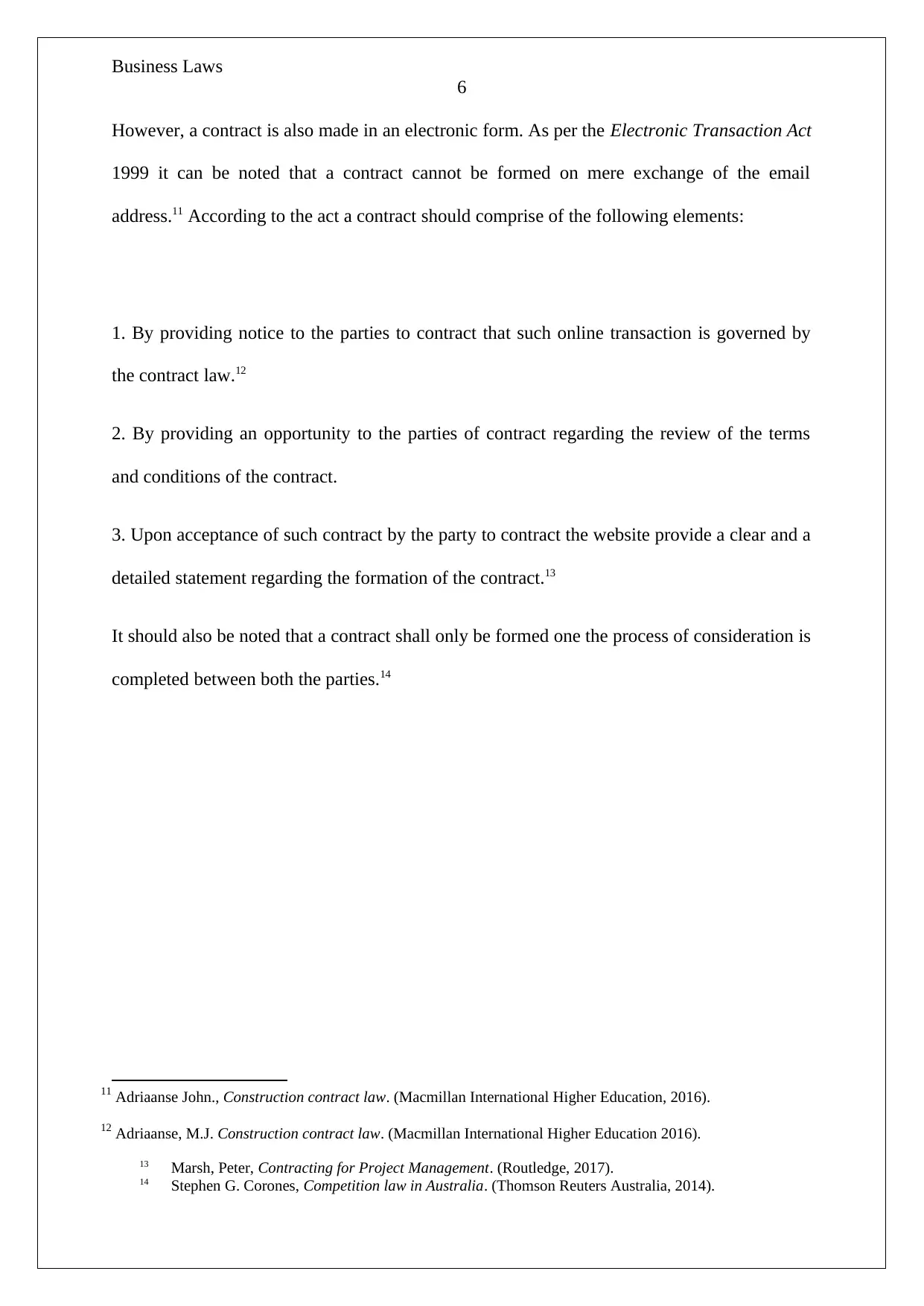
Business Laws
6
However, a contract is also made in an electronic form. As per the Electronic Transaction Act
1999 it can be noted that a contract cannot be formed on mere exchange of the email
address.11 According to the act a contract should comprise of the following elements:
1. By providing notice to the parties to contract that such online transaction is governed by
the contract law.12
2. By providing an opportunity to the parties of contract regarding the review of the terms
and conditions of the contract.
3. Upon acceptance of such contract by the party to contract the website provide a clear and a
detailed statement regarding the formation of the contract.13
It should also be noted that a contract shall only be formed one the process of consideration is
completed between both the parties.14
11 Adriaanse John., Construction contract law. (Macmillan International Higher Education, 2016).
12 Adriaanse, M.J. Construction contract law. (Macmillan International Higher Education 2016).
13 Marsh, Peter, Contracting for Project Management. (Routledge, 2017).
14 Stephen G. Corones, Competition law in Australia. (Thomson Reuters Australia, 2014).
6
However, a contract is also made in an electronic form. As per the Electronic Transaction Act
1999 it can be noted that a contract cannot be formed on mere exchange of the email
address.11 According to the act a contract should comprise of the following elements:
1. By providing notice to the parties to contract that such online transaction is governed by
the contract law.12
2. By providing an opportunity to the parties of contract regarding the review of the terms
and conditions of the contract.
3. Upon acceptance of such contract by the party to contract the website provide a clear and a
detailed statement regarding the formation of the contract.13
It should also be noted that a contract shall only be formed one the process of consideration is
completed between both the parties.14
11 Adriaanse John., Construction contract law. (Macmillan International Higher Education, 2016).
12 Adriaanse, M.J. Construction contract law. (Macmillan International Higher Education 2016).
13 Marsh, Peter, Contracting for Project Management. (Routledge, 2017).
14 Stephen G. Corones, Competition law in Australia. (Thomson Reuters Australia, 2014).
Paraphrase This Document
Need a fresh take? Get an instant paraphrase of this document with our AI Paraphraser
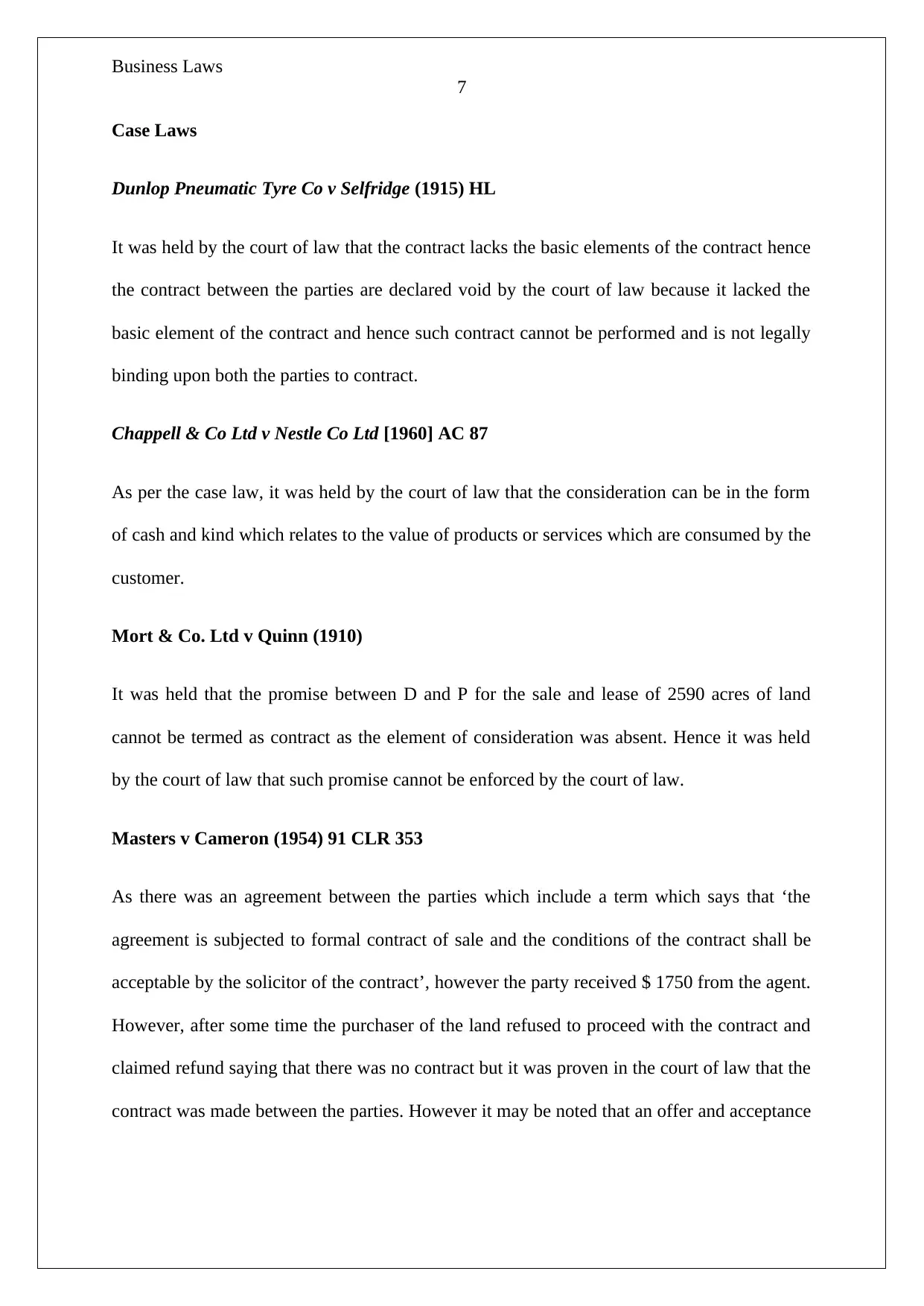
Business Laws
7
Case Laws
Dunlop Pneumatic Tyre Co v Selfridge (1915) HL
It was held by the court of law that the contract lacks the basic elements of the contract hence
the contract between the parties are declared void by the court of law because it lacked the
basic element of the contract and hence such contract cannot be performed and is not legally
binding upon both the parties to contract.
Chappell & Co Ltd v Nestle Co Ltd [1960] AC 87
As per the case law, it was held by the court of law that the consideration can be in the form
of cash and kind which relates to the value of products or services which are consumed by the
customer.
Mort & Co. Ltd v Quinn (1910)
It was held that the promise between D and P for the sale and lease of 2590 acres of land
cannot be termed as contract as the element of consideration was absent. Hence it was held
by the court of law that such promise cannot be enforced by the court of law.
Masters v Cameron (1954) 91 CLR 353
As there was an agreement between the parties which include a term which says that ‘the
agreement is subjected to formal contract of sale and the conditions of the contract shall be
acceptable by the solicitor of the contract’, however the party received $ 1750 from the agent.
However, after some time the purchaser of the land refused to proceed with the contract and
claimed refund saying that there was no contract but it was proven in the court of law that the
contract was made between the parties. However it may be noted that an offer and acceptance
7
Case Laws
Dunlop Pneumatic Tyre Co v Selfridge (1915) HL
It was held by the court of law that the contract lacks the basic elements of the contract hence
the contract between the parties are declared void by the court of law because it lacked the
basic element of the contract and hence such contract cannot be performed and is not legally
binding upon both the parties to contract.
Chappell & Co Ltd v Nestle Co Ltd [1960] AC 87
As per the case law, it was held by the court of law that the consideration can be in the form
of cash and kind which relates to the value of products or services which are consumed by the
customer.
Mort & Co. Ltd v Quinn (1910)
It was held that the promise between D and P for the sale and lease of 2590 acres of land
cannot be termed as contract as the element of consideration was absent. Hence it was held
by the court of law that such promise cannot be enforced by the court of law.
Masters v Cameron (1954) 91 CLR 353
As there was an agreement between the parties which include a term which says that ‘the
agreement is subjected to formal contract of sale and the conditions of the contract shall be
acceptable by the solicitor of the contract’, however the party received $ 1750 from the agent.
However, after some time the purchaser of the land refused to proceed with the contract and
claimed refund saying that there was no contract but it was proven in the court of law that the
contract was made between the parties. However it may be noted that an offer and acceptance
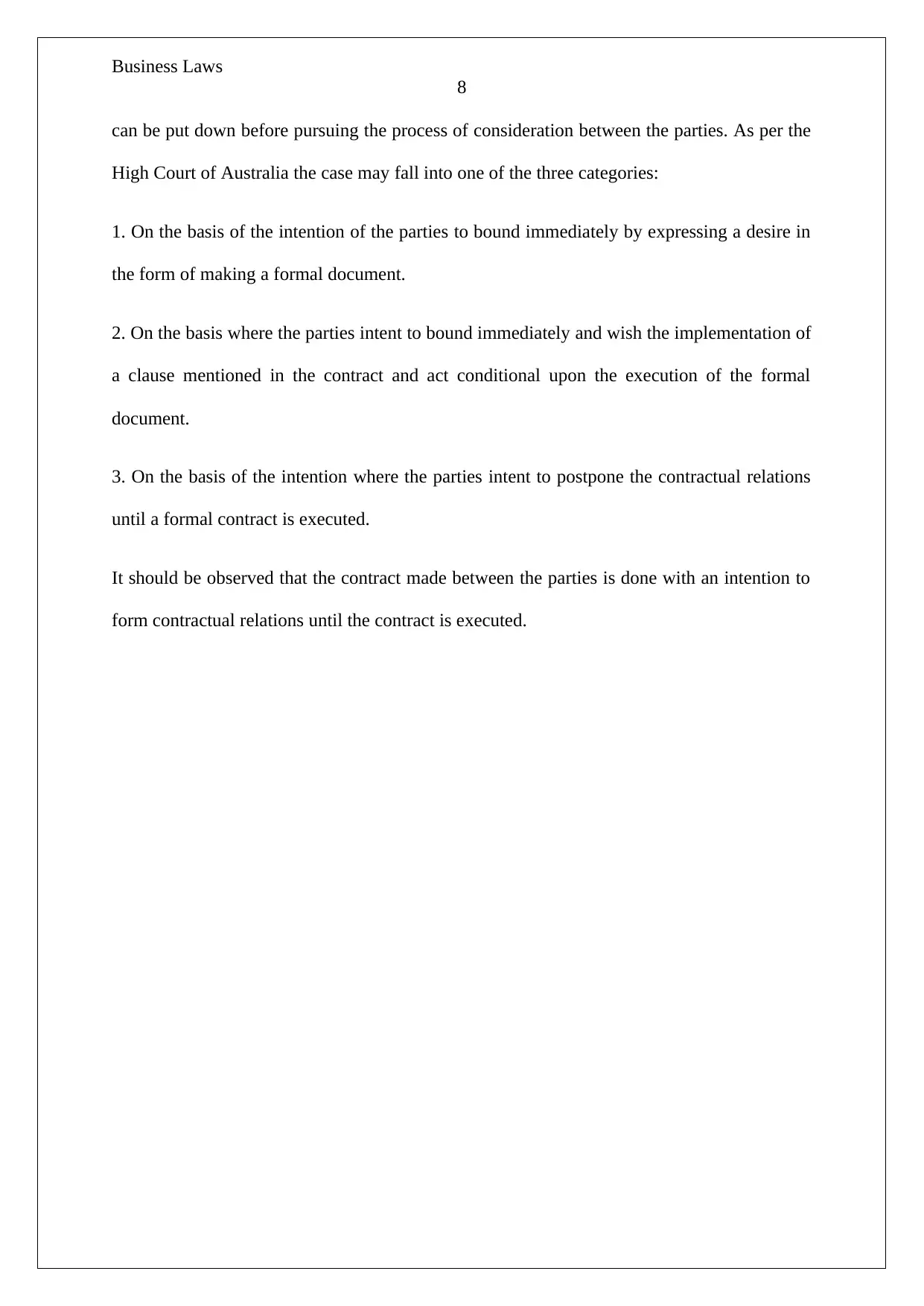
Business Laws
8
can be put down before pursuing the process of consideration between the parties. As per the
High Court of Australia the case may fall into one of the three categories:
1. On the basis of the intention of the parties to bound immediately by expressing a desire in
the form of making a formal document.
2. On the basis where the parties intent to bound immediately and wish the implementation of
a clause mentioned in the contract and act conditional upon the execution of the formal
document.
3. On the basis of the intention where the parties intent to postpone the contractual relations
until a formal contract is executed.
It should be observed that the contract made between the parties is done with an intention to
form contractual relations until the contract is executed.
8
can be put down before pursuing the process of consideration between the parties. As per the
High Court of Australia the case may fall into one of the three categories:
1. On the basis of the intention of the parties to bound immediately by expressing a desire in
the form of making a formal document.
2. On the basis where the parties intent to bound immediately and wish the implementation of
a clause mentioned in the contract and act conditional upon the execution of the formal
document.
3. On the basis of the intention where the parties intent to postpone the contractual relations
until a formal contract is executed.
It should be observed that the contract made between the parties is done with an intention to
form contractual relations until the contract is executed.
⊘ This is a preview!⊘
Do you want full access?
Subscribe today to unlock all pages.

Trusted by 1+ million students worldwide
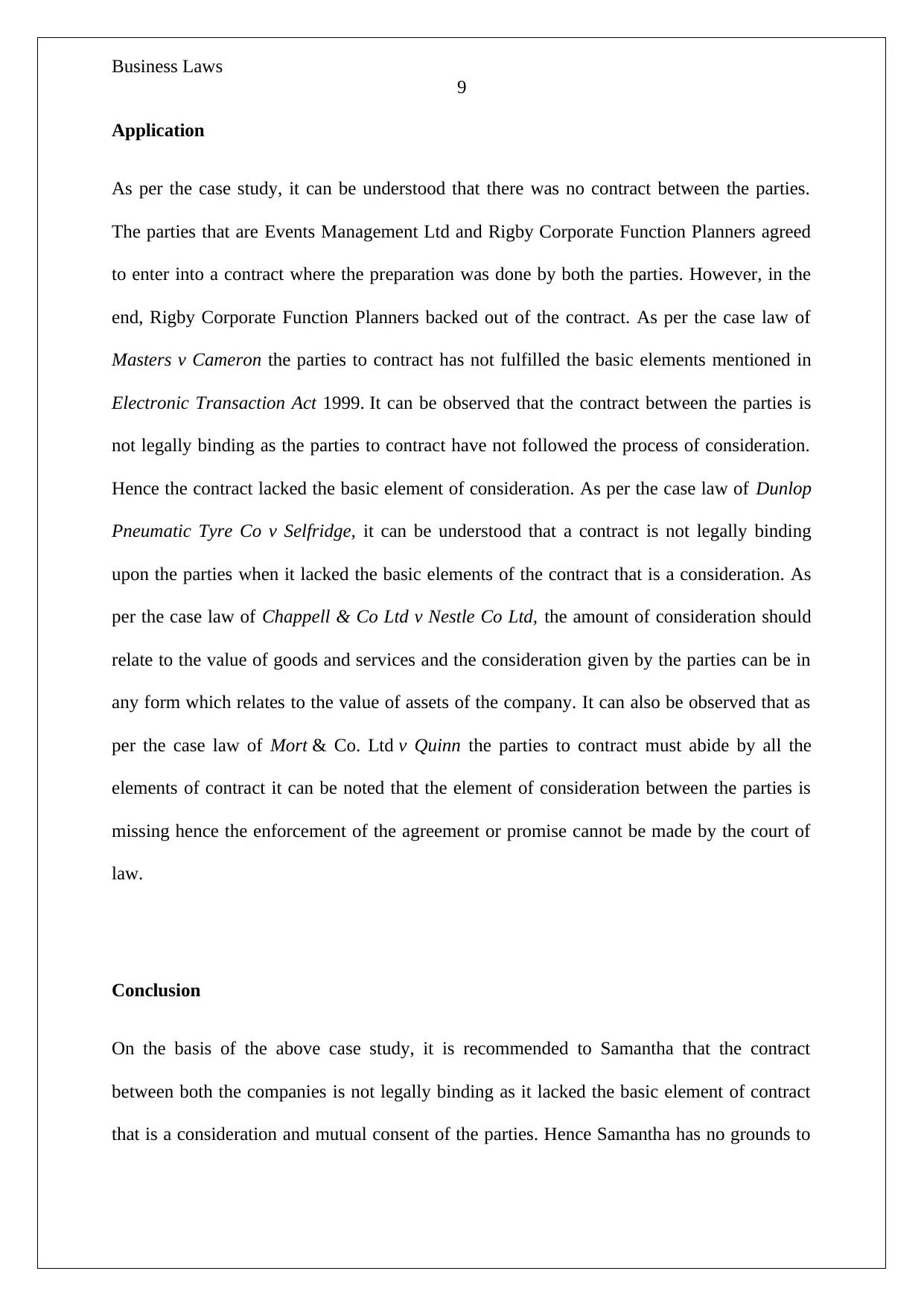
Business Laws
9
Application
As per the case study, it can be understood that there was no contract between the parties.
The parties that are Events Management Ltd and Rigby Corporate Function Planners agreed
to enter into a contract where the preparation was done by both the parties. However, in the
end, Rigby Corporate Function Planners backed out of the contract. As per the case law of
Masters v Cameron the parties to contract has not fulfilled the basic elements mentioned in
Electronic Transaction Act 1999. It can be observed that the contract between the parties is
not legally binding as the parties to contract have not followed the process of consideration.
Hence the contract lacked the basic element of consideration. As per the case law of Dunlop
Pneumatic Tyre Co v Selfridge, it can be understood that a contract is not legally binding
upon the parties when it lacked the basic elements of the contract that is a consideration. As
per the case law of Chappell & Co Ltd v Nestle Co Ltd, the amount of consideration should
relate to the value of goods and services and the consideration given by the parties can be in
any form which relates to the value of assets of the company. It can also be observed that as
per the case law of Mort & Co. Ltd v Quinn the parties to contract must abide by all the
elements of contract it can be noted that the element of consideration between the parties is
missing hence the enforcement of the agreement or promise cannot be made by the court of
law.
Conclusion
On the basis of the above case study, it is recommended to Samantha that the contract
between both the companies is not legally binding as it lacked the basic element of contract
that is a consideration and mutual consent of the parties. Hence Samantha has no grounds to
9
Application
As per the case study, it can be understood that there was no contract between the parties.
The parties that are Events Management Ltd and Rigby Corporate Function Planners agreed
to enter into a contract where the preparation was done by both the parties. However, in the
end, Rigby Corporate Function Planners backed out of the contract. As per the case law of
Masters v Cameron the parties to contract has not fulfilled the basic elements mentioned in
Electronic Transaction Act 1999. It can be observed that the contract between the parties is
not legally binding as the parties to contract have not followed the process of consideration.
Hence the contract lacked the basic element of consideration. As per the case law of Dunlop
Pneumatic Tyre Co v Selfridge, it can be understood that a contract is not legally binding
upon the parties when it lacked the basic elements of the contract that is a consideration. As
per the case law of Chappell & Co Ltd v Nestle Co Ltd, the amount of consideration should
relate to the value of goods and services and the consideration given by the parties can be in
any form which relates to the value of assets of the company. It can also be observed that as
per the case law of Mort & Co. Ltd v Quinn the parties to contract must abide by all the
elements of contract it can be noted that the element of consideration between the parties is
missing hence the enforcement of the agreement or promise cannot be made by the court of
law.
Conclusion
On the basis of the above case study, it is recommended to Samantha that the contract
between both the companies is not legally binding as it lacked the basic element of contract
that is a consideration and mutual consent of the parties. Hence Samantha has no grounds to
Paraphrase This Document
Need a fresh take? Get an instant paraphrase of this document with our AI Paraphraser

Business Laws
10
sue the company on breach of contract. However, Samantha has the right to claim for
damages as the money, time and manpower invested to perform the contract.
10
sue the company on breach of contract. However, Samantha has the right to claim for
damages as the money, time and manpower invested to perform the contract.
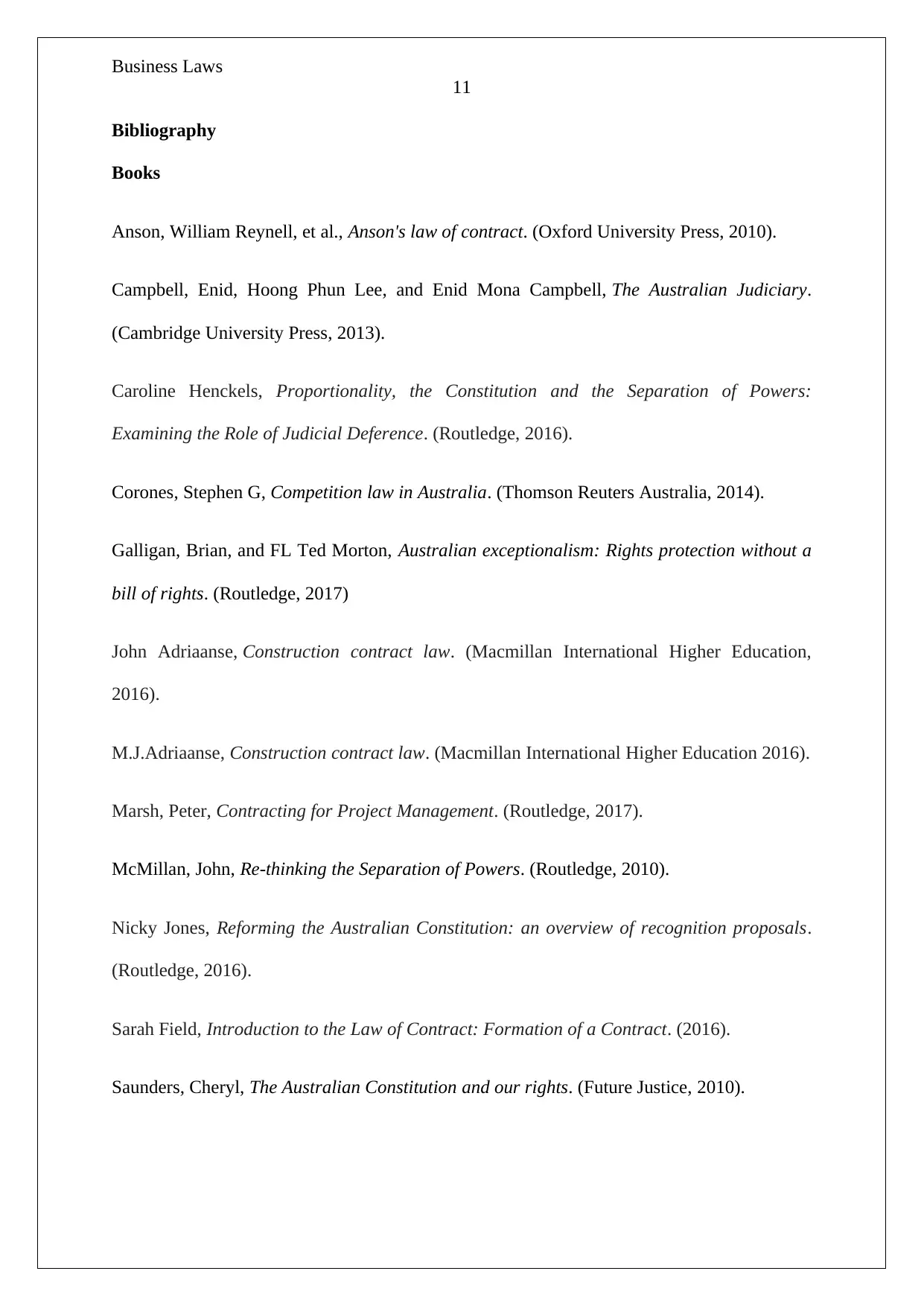
Business Laws
11
Bibliography
Books
Anson, William Reynell, et al., Anson's law of contract. (Oxford University Press, 2010).
Campbell, Enid, Hoong Phun Lee, and Enid Mona Campbell, The Australian Judiciary.
(Cambridge University Press, 2013).
Caroline Henckels, Proportionality, the Constitution and the Separation of Powers:
Examining the Role of Judicial Deference. (Routledge, 2016).
Corones, Stephen G, Competition law in Australia. (Thomson Reuters Australia, 2014).
Galligan, Brian, and FL Ted Morton, Australian exceptionalism: Rights protection without a
bill of rights. (Routledge, 2017)
John Adriaanse, Construction contract law. (Macmillan International Higher Education,
2016).
M.J.Adriaanse, Construction contract law. (Macmillan International Higher Education 2016).
Marsh, Peter, Contracting for Project Management. (Routledge, 2017).
McMillan, John, Re-thinking the Separation of Powers. (Routledge, 2010).
Nicky Jones, Reforming the Australian Constitution: an overview of recognition proposals.
(Routledge, 2016).
Sarah Field, Introduction to the Law of Contract: Formation of a Contract. (2016).
Saunders, Cheryl, The Australian Constitution and our rights. (Future Justice, 2010).
11
Bibliography
Books
Anson, William Reynell, et al., Anson's law of contract. (Oxford University Press, 2010).
Campbell, Enid, Hoong Phun Lee, and Enid Mona Campbell, The Australian Judiciary.
(Cambridge University Press, 2013).
Caroline Henckels, Proportionality, the Constitution and the Separation of Powers:
Examining the Role of Judicial Deference. (Routledge, 2016).
Corones, Stephen G, Competition law in Australia. (Thomson Reuters Australia, 2014).
Galligan, Brian, and FL Ted Morton, Australian exceptionalism: Rights protection without a
bill of rights. (Routledge, 2017)
John Adriaanse, Construction contract law. (Macmillan International Higher Education,
2016).
M.J.Adriaanse, Construction contract law. (Macmillan International Higher Education 2016).
Marsh, Peter, Contracting for Project Management. (Routledge, 2017).
McMillan, John, Re-thinking the Separation of Powers. (Routledge, 2010).
Nicky Jones, Reforming the Australian Constitution: an overview of recognition proposals.
(Routledge, 2016).
Sarah Field, Introduction to the Law of Contract: Formation of a Contract. (2016).
Saunders, Cheryl, The Australian Constitution and our rights. (Future Justice, 2010).
⊘ This is a preview!⊘
Do you want full access?
Subscribe today to unlock all pages.

Trusted by 1+ million students worldwide
1 out of 13
Related Documents
Your All-in-One AI-Powered Toolkit for Academic Success.
+13062052269
info@desklib.com
Available 24*7 on WhatsApp / Email
![[object Object]](/_next/static/media/star-bottom.7253800d.svg)
Unlock your academic potential
Copyright © 2020–2026 A2Z Services. All Rights Reserved. Developed and managed by ZUCOL.





